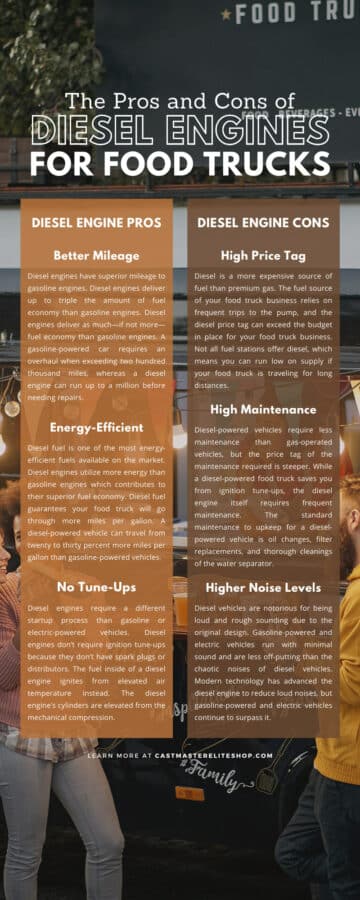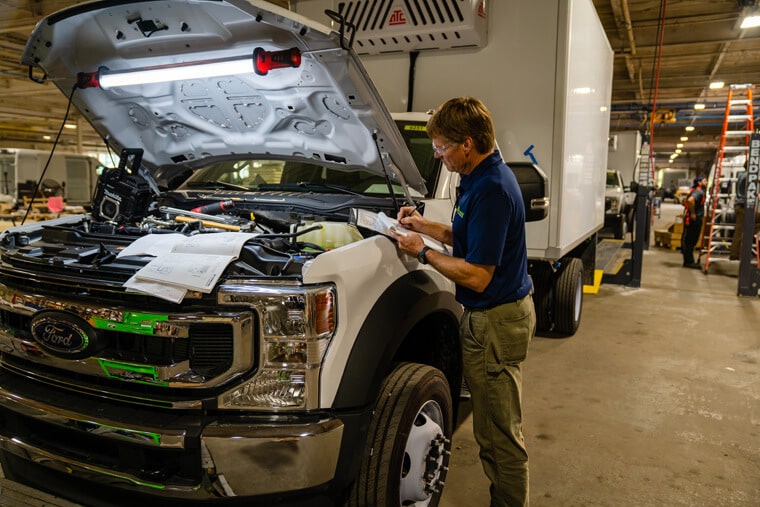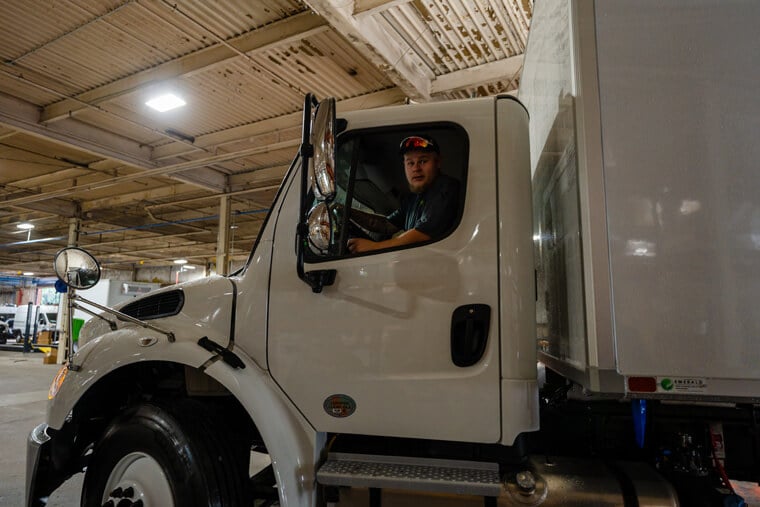
The Pros and Cons of Diesel Engines for Food Trucks
Todd Cawley | June 13th, 2022
Investing in a food truck requires you to consider specific automobile features to help optimize your business. When deciding on a food truck to purchase for your business, it’s important to examine if there is a diesel or gasoline engine powering it. If you’re exploring refrigerated vehicles for sale, the option between a gasoline or diesel engine can help define the best choice for your budget and performance needs. Explore the pros and cons of diesel engines for food trucks to help you make the most economical and efficient power source for your food truck business.
Diesel Engine Pros
Better Mileage
Diesel engines have superior mileage to gasoline engines. Diesel engines deliver up to triple the amount of fuel economy than gasoline engines. Diesel engines deliver as much—if not more—fuel economy than gasoline engines. A gasoline-powered car requires an overhaul when exceeding two hundred thousand miles, whereas a diesel engine can run up to a million before needing repairs. Better mileage on your food truck vehicle ensures more delivery routes without exceeding budget limits on your food truck business.
Energy-Efficient
Diesel fuel is one of the most energy-efficient fuels available on the market. Diesel engines utilize more energy than gasoline engines which contributes to their superior fuel economy. Diesel fuel guarantees your food truck will go through more miles per gallon. A diesel-powered vehicle can travel from twenty to thirty percent more miles per gallon than gasoline-powered vehicles. Diesel fuel engines are ideal for long-haul vehicles and require fewer stops for fuel, which extends the driving period of your food truck and optimizes business productivity.
No Tune-Ups
Diesel engines require a different startup process than gasoline or electric-powered vehicles. Diesel engines don’t require ignition tune-ups because they don’t have spark plugs or distributors. The fuel inside of a diesel engine ignites from elevated air temperature instead. The diesel engine’s cylinders are elevated from the mechanical compression. Gasoline-powered vehicles require spark plugs and the cost of maintenance that’s needed to keep them operating. Standard tune-ups are an expensive maintenance procedure that you can save your food truck business from with a diesel engine.
Increased Torque
The torque inside of a vehicle is the rotational force applied to the combustible engine. Torque is a force that acts on the body of a vehicle through a lever to allow exertion. Trucks, SUVs, and other large vehicles opt for diesel engines for the towing capacities permitted by an increased torque. A diesel engine provides an increased torque that allows your food truck to have a more powerful startup between driving and stopping. An increased torque allows a vehicle to haul heavy objects without difficulty. A gasoline-powered car won’t easily tow a hefty load unless it is lighter than the vehicle itself. A food truck hauls the entirety of your business, which means it’s important that its towing capacity is efficient for harboring the weight of your supply.
Diesel Engine Cons
High Price Tag
Diesel is a more expensive source of fuel than premium gas. The fuel source of your food truck business relies on frequent trips to the pump, and the diesel price tag can exceed the budget in place for your food truck business. Not all fuel stations offer diesel, which means you can run low on supply if your food truck is traveling for long distances.
The high price tag of diesel fuel also includes the cost of maintenance and mechanical repairs. If a part on your food truck need replacing, car dealers who have more expensive mechanical services can provide your vehicle with professional care.
High Maintenance
Diesel-powered vehicles require less maintenance than gas-operated vehicles, but the price tag of the maintenance required is steeper. While a diesel-powered food truck saves you from ignition tune-ups, the diesel engine itself requires frequent maintenance.
The standard maintenance to upkeep for a diesel-powered vehicle is oil changes, filter replacements, and thorough cleanings of the water separator. If your diesel-powered food truck breaks down, the repairs are more costly than fixing a standard gasoline-powered vehicle.
Higher Noise Levels
Diesel vehicles are notorious for being loud and rough sounding due to the original design. Gasoline-powered and electric vehicles run with minimal sound and are less off-putting than the chaotic noises of diesel vehicles. Modern technology has advanced the diesel engine to reduce loud noises, but gasoline-powered and electric vehicles continue to surpass it. The high noise levels of your food truck can interfere with business as it can sound disruptive and less appealing to potential customers. If your truck is operating while doing a business transaction, the noise can deter the customer experience. The loudness of a diesel engine can also make it harder to detect mechanical issues in your food truck while it is running.
Decreased Horsepower
The price of an increased torque on a diesel-powered vehicle is the reduction in horsepower. The horsepower is a unit of measurement on a vehicle that refers to the output of the engine. It’s important for your food truck to have a sufficiently powered engine to maintain pace throughout deliveries and extended transportation.
While the towing capacity is strong on a diesel-powered vehicle, the speed power and ability to maintain speed decreases. The decreased horsepower is a major reason why diesel-powered vehicles are not conducive to everyday driving. If you’re considering using a diesel-powered vehicle as your food truck, consider if the towing capacity exceeds the importance of speed power for your business.
It’s important to understand the pros and cons of diesel engines for food trucks when choosing which kind is best to power your mobile food truck business. Commercial truck manufacturers continue to improve diesel technology to meet the needs of different industries. Selecting the right kind of food truck for your business relies on the quality of the power source and what it requires to maintain as a business owner.
We invite you to explore Emerald Transportation Solutions wide variety of vehicles to meet your food truck business demands. Feel free to extend any questions about our products to our team of professionals.
Related Articles
Contact Us
Feel Free To Contact Us If You Have Any Questions
What does under DOT mean?
Questions regarding DOT requirements come up often. 10,000 lbs GVW (gross vehicle weight) and over are commercial vehicles that fall under the Department of Transportation regulatory requirements.
What is the difference between GVW and payload?
GVW or Gross Vehicle Weight is the entire weight of the vehicle including the payload. The payload weight represents the amount of cargo you are hauling.
What is a self-powered unit and a vehicle-powered unit?
A self-powered unit has its own fuel source and will run independent of the truck. This is the heaviest and most expensive option. While vehicle-powered units run off the engine via a compressor mounted on the engine. These are less expensive and lighter in weight but you must run the truck or plug the electric standby into shore power.
What does K-factor mean and why is that important?
K-factor is a term that stands for the overall insulating value of the container (truck body). Quite simply the lower the K-factor the better the truck body will be able to maintain a given temperature and require less energy to do so.
How much lighter is a Poly Van vs a US spec body?
Poly Van bodies are very light. On average we estimate we are 75-150 lbs per foot lighter than a traditional sheet and post foamed in place body. These weight savings translates to less fuel burn and less CO2 emissions, along with added payload, the most important benefit.







